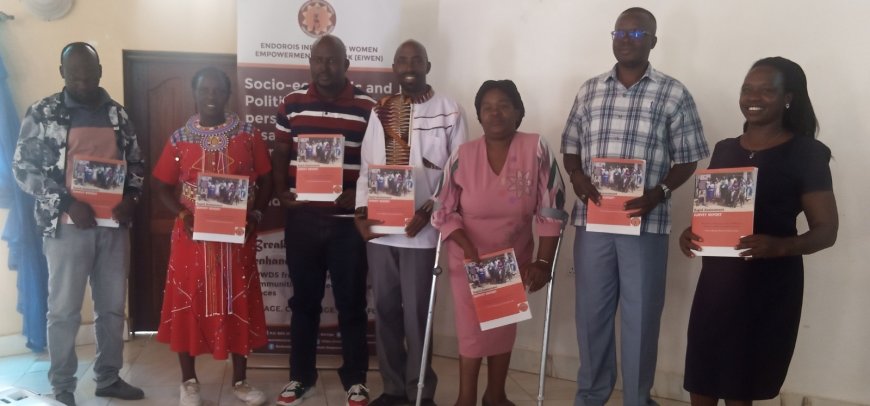PWDs from marginalized ethnic minorities fight for leadership space

Kabarnet, Tuesday, April 18, 2023
K.N.A By Caroline Cherono
Despite the challenges that marginalized indigenous communities of Baringo County face, they have built resilience over the years by creating advocacy to enable them to take up leadership opportunities in order to spearhead change in the community.
Christine Kandie, Executive Director of Endorois Indigenous (EIWEN) a local community-based organization in Baringo County that was founded in 2019 has braved all odds despite having a disability to champion for the rights of girls, women and persons with disabilities (PWDs) through training to enhance leadership skills.
Since its inception, Eiwen has trained over 150 persons with disabilities (PWDs) on leadership skills development despite the enormous setbacks such as poverty, drought, social and cultural stigma, mobility and security challenges.
Recently, the CBO launched a rapid assessment survey report at Mogotio Sub-County that saw representatives of PWDs aspirants/candidates during the 2022 general elections from Baringo, Nakuru, Narok counties share their experiences, lessons and recommendations that formed the gist of the report.
The report captured the views of persons who took part as candidates or sought party nominations for member of county assembly (MCA) seats during the August 2022 elections in Baringo, Nakuru and Narok counties.
“Together with Minority Rights International (MRG) we are implementing a project titled ‘Monitoring the extent of inclusion of PWDs from marginalized ethnic minorities into Kenya's leadership space. Our mission is to improve the quality of life of indigenous women, girls and PWDs through economic, social and political empowerment,” Kandie said.
Kandie noted that as per the 2019 Kenya Population and Housing Census persons with disability make up about two percent of Kenya's population and their unique needs and unique reasons for improving public services especially in social sectors was paramount hence the need to mentor residents from minority communities to take up leadership roles in all sectors to improve living standards.
One PWD aspirant, Dominic Kipngetich, who vied in 2017 and 2022 general election for MCA seat in Koibatek ward in Eldama Ravine Sub-County noted with concern that as a PWD the major challenge experienced was lack of funds to run a successful campaign yet elections is a very expensive affair right from nomination to the elections.
“The notion that someone will automatically nominate PWD waters down our ambitions since we are convinced to step down and wait for nomination slots which are very limited and corrupt leaders reward their relatives. Another challenge I experienced is that most facilities lack PWD friendly buildings whereby meeting venues, polling stations and registration centers are located. The buildings lack ramps and proper sanitation facilities, hence making it difficult for us to access the premises,” Kibet added.
Damaris Karuri, a PWD and an MCA aspirant from Roda ward in Nakuru County, said lack of funds, information gap, social and cultural stigma coupled with mobility and security issues were the major challenges she experienced during the electioneering period.
“As a woman, lack of funds to produce posters, tight deadlines by the independent elections and boundaries commission (IEBC) and voter bribery and propaganda were some of the major challenges that I experienced during the elections,” Karuri said.
The Key survey findings showed that participation of PWDs in the electoral process is low as it showed that in the 2022 general elections in Baringo County only 10 PWDs aspired for MCA seats and nomination slots and all of them lost except one while there were no aspirants for member of national assembly, senate and governor positions in the county.
Owing to the survey, there are many opportunities for PWDs as IEBC conducted open electoral processes, community advocacy and mentorship programs are slowly changing community perceptions in favour of PWDS, and increased civil society focus as many PWDs candidates are being trained and supported by the civil society organizations.
According to the survey, the country has made some gains towards enhancing PWD inclusion and participation in elections through sustained civic and political education.
Political parties on their part should support inclusivity of PWDs by waiving nomination fees and keep them engaged throughout the electoral process while parliament ought to review existing electoral laws in the constitution of Kenya 2010 to further promote representation of PWDs in the elective bodies based on the lessons learnt so far.
What's Your Reaction?



































































































































































































































































































